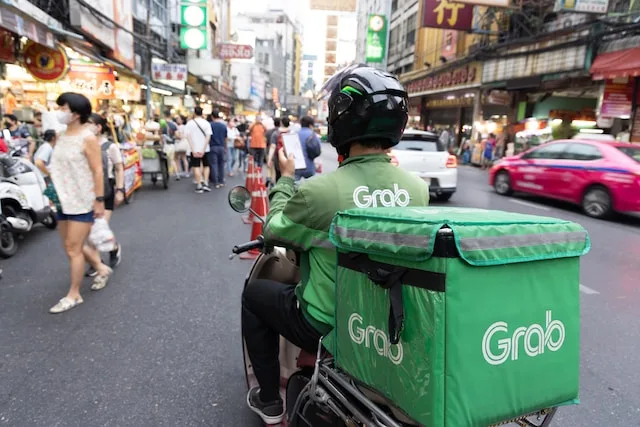Easy to access loans designed for gig workers are almost impossible to refuse. But there’s nearly always a catch.
 Precarious gig workers can get trapped in debt due to the easy access to loans. : Andri Aprianto (@andriapr) available in https://bit.ly/3thdeAi By Unsplash
Precarious gig workers can get trapped in debt due to the easy access to loans. : Andri Aprianto (@andriapr) available in https://bit.ly/3thdeAi By Unsplash
Easy to access loans designed for gig workers are almost impossible to refuse. But there’s nearly always a catch.
When you’re a temporary, un-contracted worker in southeast Asia’s vast gig economy, the promise of easy finance can be too tempting to resist.
For many in the precarious gig economy it’s as simple as downloading an app, answering some questions then waiting for the cash to hit your account.
The World Bank’s 2023 report on gig economy workers in 17 countries shows that around 60 percent of Indonesian gig workers find it challenging to meet their financial obligations. Only 34 percent had precautionary savings.
Indeed, millions of people across Indonesia and the rest of southeast Asia do not even engage with official financial institutions. As a result, informal financers — some with dubious lending practices — thrive.
In recent years, the explosion of online lending has provided new ways for low-income individuals to get money.
Into this scenario have stepped new players: rideshare companies such as Grab and Gojek, through collaborations with financial institutions, now provide their drivers greater access to lending schemes.
Gig workers have to live without the security of a stable job and a regular paycheque. With no employee benefits, they are more likely to suffer a loss of income due to illness, injury or a downturn in business, such as during the COVID-19 pandemic.
It was during the pandemic that Bank Rakyat Indonesia initiated a low-interest loan for rideshare drivers. The loan allowed transport app companies to provide loans for their drivers who are classified as partners and micro-entrepreneurs, not employees.
GrabModal Narik, offers loans through a collaboration between JULO (a fintech lending platform) and Grab. Its advertisements are squarely aimed at gig workers, using slogans like #PinterAturDuit (smart at managing money) to promote the GrabModal Narik loan scheme.
They also provide an option for a driver taking a personal loan to use the auto-debit feature, where the driver’s daily earnings are automatically deducted to repay the loan to the lending institution. The option makes it easier for the driver to pay in installments.
Information about the online scheme (along with an invitation to apply) is provided through a notification sent to drivers’ phones, though only to those eligible. A borrower must drive for Grab for at least three months to be eligible. Loan approval also depends on the driver’s financial record. A default limits their access to future credit opportunities.
Companies offering online loans such as Finplus, Kredivo, Amartha, and Dompet Kilat have mushroomed in Indonesia. These advertise themselves as providing a fast process that excludes lengthy credit checks. This is particularly compelling, especially in times of financial hardship.
With just a few taps on a smartphone, anyone can apply for a loan and have the money transferred directly into their bank account.
Finplus, for instance, has just three simple steps:
- Download the app and sign up for an account.
- Choose which financial services appropriate for your needs.
- The money will be sent to your registered bank account within 24 hours.
Some online lending platforms (including Finplus, Kredivo, and Dompet Kilat) are registered with the Otoritas Jasa Keuangan (The Financial Services Authority, or OJK). But others are unlicensed and considered to be operating illegally.
In times of hardship, some potential borrowers are unaware they are engaging with unlicensed moneylenders, which can charge exorbitantly high interest rates (much higher than the one regulated by the OJK). Unregistered moneylenders sometimes have dubious procedural terms and misuse lenders’ private and confidential information.
Taking personal loans provides precarious gig workers with an easy solution to deal with day-to-day hardship. However, their fluctuating income means they often struggle to repay their debts.
Precarious working and living conditions provide the setting for the creation of new exploitative lending instruments to the benefit of financial institutions. A Kompas report revealed that 2.5 million people are struggling to repay their online loans and 57 percent of them are young people (17-34 years old) in low-wage precarious work.
For many app-based transport drivers, being trapped in debt often drives them to work long hours without adequate rest. Stress from being unable to properly support their family can also affect their health.
This element of contemporary capitalism has not only outsourced the labour but also the bulk of responsibility for workers’ welfare onto the worker themselves. To address this, policy makers could aim to roll back the normalisation of new forms of precarious work.
Access to basic employment rights (minimum wage, health and safety, freedom to join a union, among others) could be extended to precarious workers in the gig economy even if they want to work more flexibly.
Diatyka Widya Permata Yasih is an assistant professor at Department of Sociology and Deputy Director for Academic Affairs at Asia Research Centre, Faculty of Social and Political Sciences, Universitas Indonesia.
Nur Rafiza Putri is a research fellow at Asia Research Centre, Universitas Indonesia and a lecturer at Universitas Nasional.
Indrawan Prasetyo is a research fellow at Asia Research Centre, Universitas Indonesia
This article is part of a Special Report on the Asian Gig Economy, produced in collaboration with the Asia Research Institute – University of Indonesia.
Originally published under Creative Commons by 360info™.













